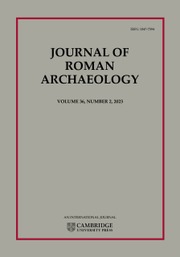Article contents
Renewed work at the Roman camps at Renieblas near Numantia (2nd-1st c. B.C.)
Published online by Cambridge University Press: 05 October 2020
Extract
Iberia was one of the first overseas territories to fall under Roman control when the provinces of Hispania Citerior and Ulterior were established in 197 B.C., preceded only by Sicilia (241) and Sardinia et Corsica (227).1 Renieblas and the sites surrounding Numantia are among the first camps of Rome‘s earliest overseas expansion to be confidently identified archaeologically. They are central in analyses of the Republican army and Roman siegeworks,2 the conquest of Hispania,3 and the effects of the war on local communities.4
- Type
- Articles
- Information
- Copyright
- © Journal of Roman Archaeology L.L.C. 2020
- 2
- Cited by




